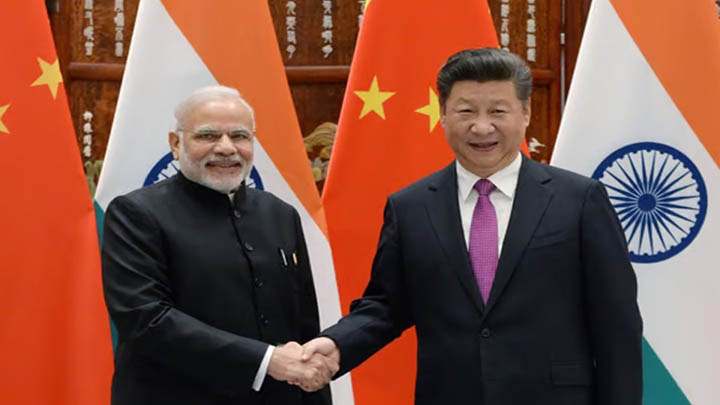
JK News Today Commentary
Prime Minister Narendra Modi during his meeting with Chinese President Xi Jingping on Sunday laid a foundation for new world order in which the very concept of mutual respect and trust will define bilateral and multilateral relations across the countries.
The Indian mantra of treating others with respect and securing the same was reiterated by PM during his meeting with the Chinese President , underlining the fact that India wants to build its relationship with other countries on the basis of equality in thinking and practice.
Sunday- August 31, 2025 , will be inserted as a historic day in the Indo-China relations because of multiple reasons, but essentially two: it’s Modi’s first visit to China in seven years, second , though it is meant to take part in the SCO summit in Tianjin , coastal city in northern China , but its impact will be felt worldwide , particularly in the US and Europe .
In his brief remarks , after the meeting , the Indian Prime Minister spoke of the positive direction the relations between two countries have taken . He saw lot of positives in return of peace on borders following disengagement on borders . It was a clear reference to the high-wire tensions on Line of Actual Control ( LAC) in eastern Ladakh, where Indian and Chinese troops were virtually in a face-to face situation for more than four-and-half years .
This calm on the borders , Prime Minister observed has given him the hope to carry forward these relations forward with a commitment of mutual trust, respect and sensitivity, and in this context, he also mentioned the resumption of direct flights and resumption of Kailas Mansarovar pilgrimage .. the most important point in the whole thing is that coming together of the two Asian giants on the similar line of thinking spells out a peaceful future for the humanity , it obviously include the powers that boast of making peace but providing shield to terror-oriented countries.
The timing of the SCO summit was decided months ago, but by the time, t took place, much had changed in the world order. US President Donald Trump had not only imposed 50 per cent tariff on the Indian imports to his country , but also south to humiliate India for purchasing the Russian crude .Trump undid the quarter of a century bonhomie and high-grade brotherly diplomacy between the two countries.
Practically speaking , it was a great irony in the international relations. India was perceived to be one of the closest allies of the US, as also the strategic partner, committed to enhancing the mutual cooperation and trust. The western world, especially, the US, saw India as a counterweight to China,. Now the roles seemed to have reversed .
Prime Minister while focusing on the role of India and China working for the peace in the world , made it clear that this relationship guarantees peace for the humanity. The whole axis of peace rests on their role. .This , in itself , was a message to America that India makes its own decisions ,high tariffs and penalties would not deter it from pursuing the relationships with other countries . India is a nation committed to save its strategic and economic autonomy. By extension , this also is a message to the whole world .
If all the words spoken by Prime Minister in China are to be decoded , there is yet another messaging that India is on path of becoming the third largest economy in the near future and may be a leader in the world by 2047. This hope and promise as commitment is intrinsically linked to India becoming the most developed country in 2047.
This decision of PM Modi to have a positive and cooperative relation with China on the basis of mutual respect, trust and sensitivities places certain rules in perspective ; one that India and China are free to pursue their quest for economic development without coming into each other’s way. That , in simple words , means that India will have its own independent policy toward other nations notwithstanding what relations China has with those countries.
China has very good relations with Pakistan . Their friendship is iron clad , and both have supplemented each other over the decades . Pakistan is the first nation that offered its unconditional cooperation to China’s Belt and Road Initiative – China –Pakistan Economic Corridor is the pilot project of this initiative . The CPEC- 2 phase also is scheduled to be launched during Pakistan Prime Minister Shehbaz Sharif’s visit to China for the SCO summit. Pakistan also is member of this grouping .
India has a particular view , which came about after endless hostile actions launched by Pakistan against India. The April 22 Pahalgam terror attack and the subsequent threats of nuclear strikes by Pakistani army chief Field Marshal Asim Munir and others have confirmed the Indian perception and belief that Pakistan is a terror-exporting state . China may be having different thoughts about Pakistan, but the communist country too is worried about the growing terrorism in that country. Several Chinese nationals and assets have been targeted by Pakistani terrorists and despite several promises to take on the terrorists targeting Chinese , nothing has been done to neutralize the terrorist and their actions. Beijing, however, is in a wait and watch situation .
This is where the issue of the mutual respect assumes great significance . China will have to understand India’s concerns on Pakistan sponsored terrorism and respond accordingly . Terrorism is a universal threat , a recipe for death and destruction , China needs to measure this threat accordingly, and otherwise friendship with Pakistan may become a liability for it.
With today’s meeting PM Modi has laid a new pathway in relations with China. It is a way forward and needs to be smoothened further.




